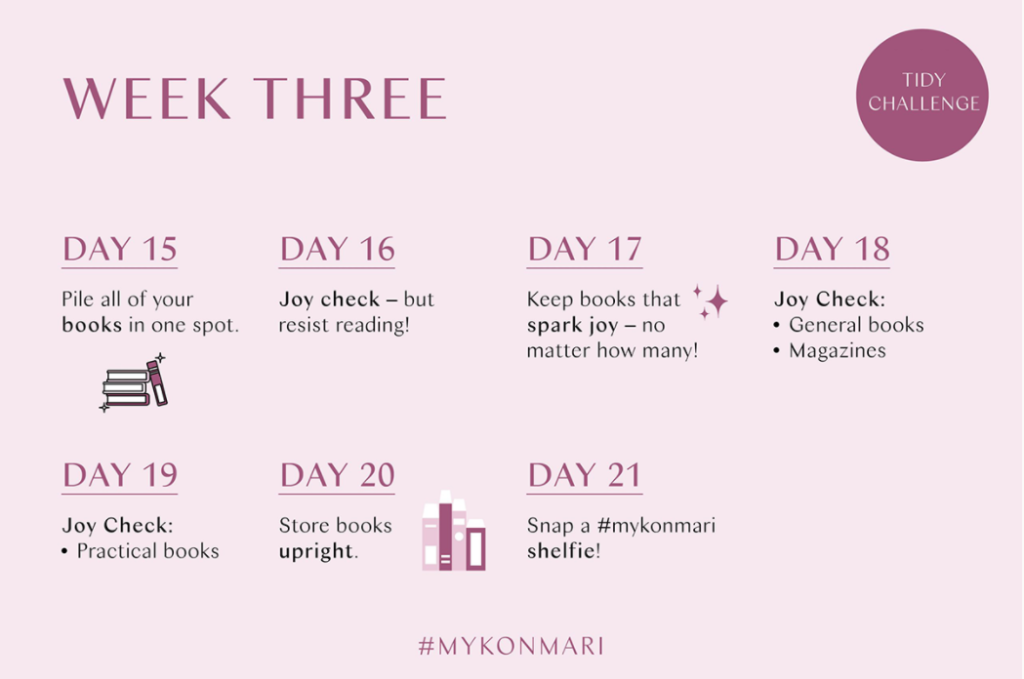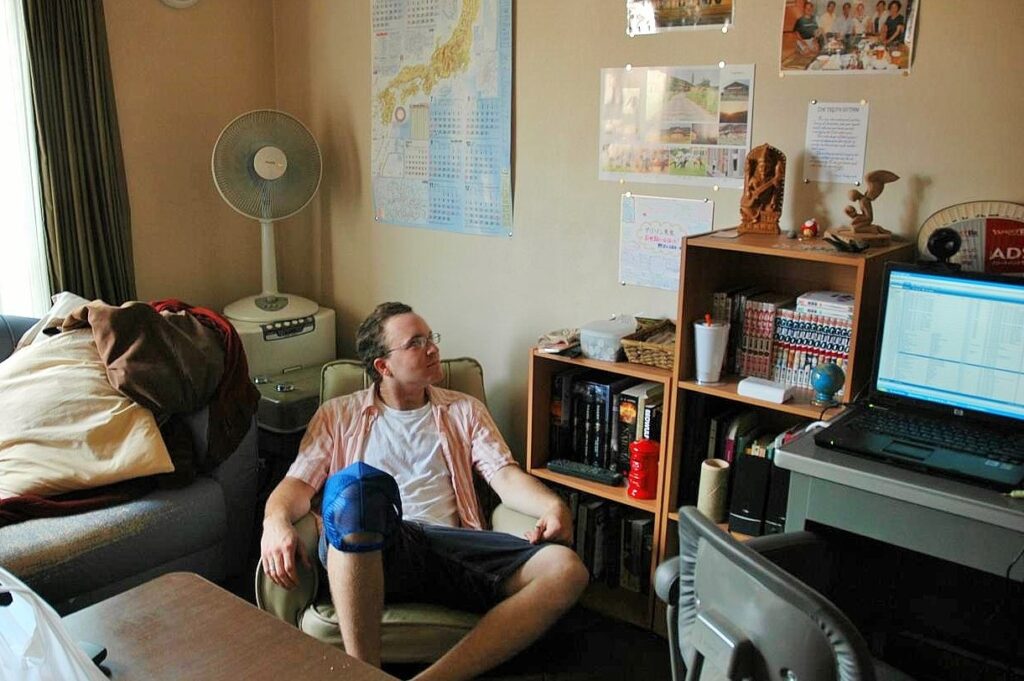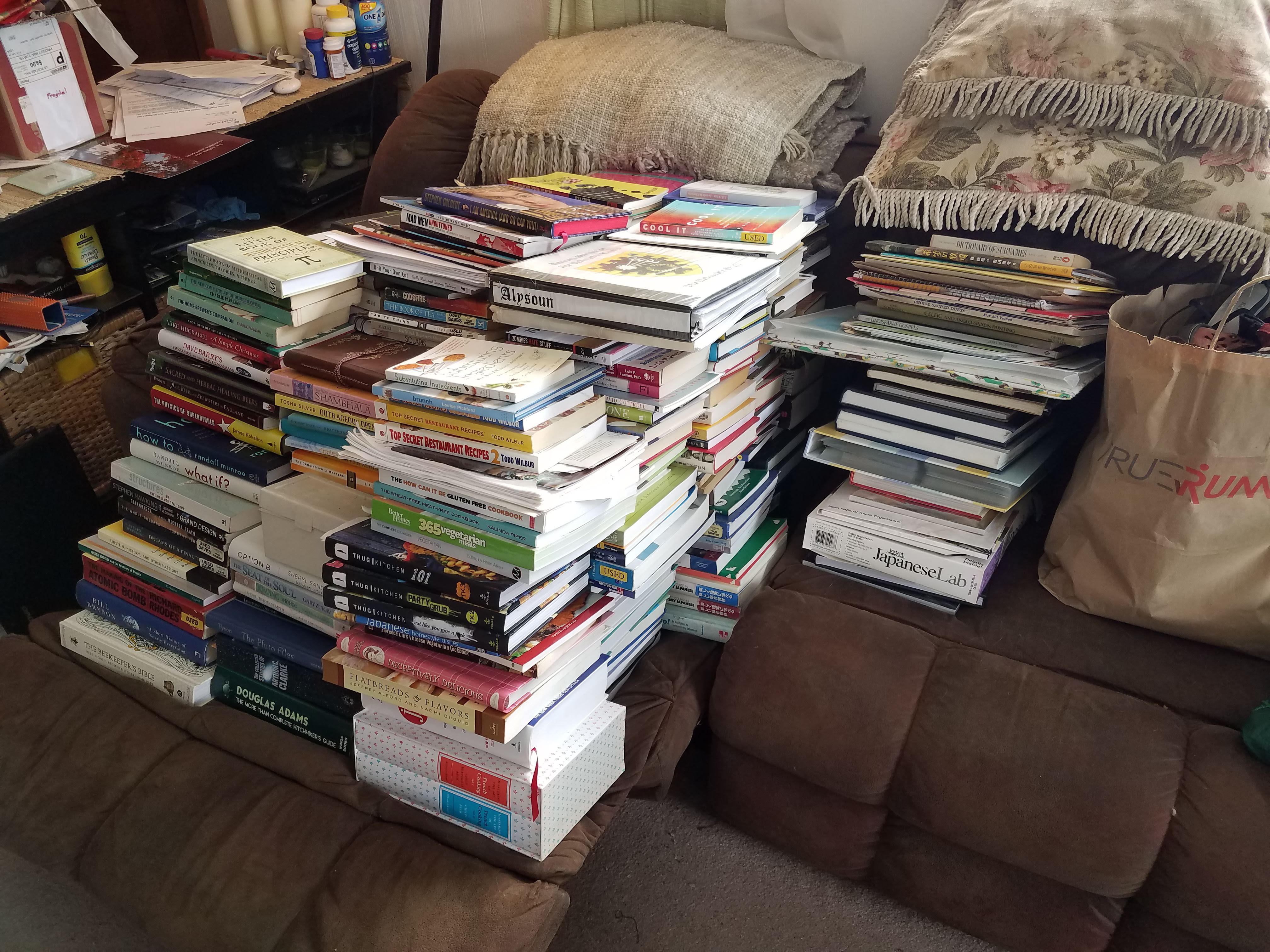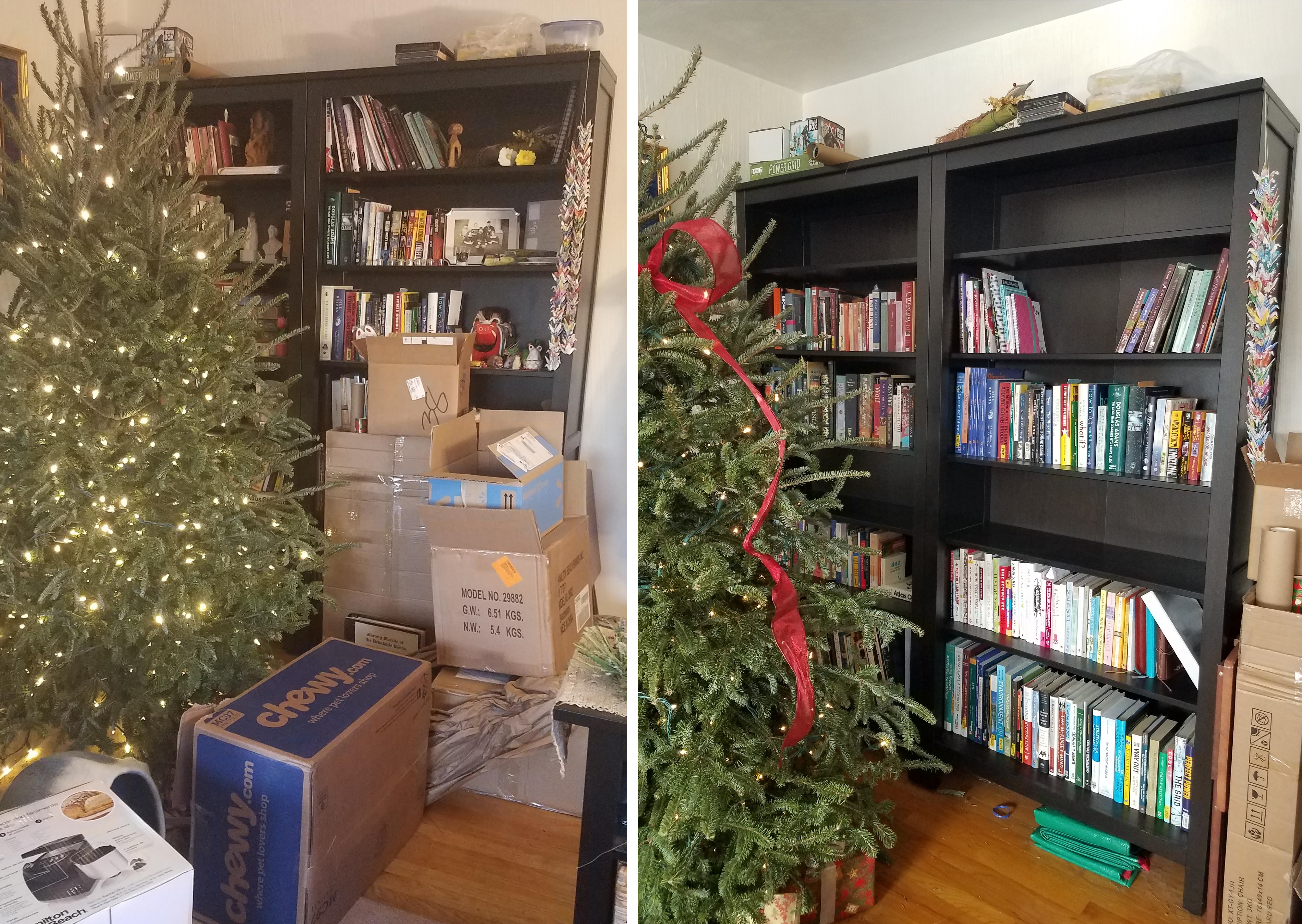Week 3 – Books
If I remember correctly, one of my earliest introductions to Marie Kondo, if not the earliest, was through the now-infamous meme in which she purportedly instructed people to keep no more than 30 of their books. When this meme went viral about two years ago, the internet exploded with infuriated bookworms who couldn’t believe someone would dare dictate to them about how many books was acceptable. I mostly saw a more light-hearted response with jokes like “30 books… per subject, right?” or “did she mean 30 book…shelves?” but I understand that the outrage got pretty ugly in some places.[1]
To set the record straight, Marie Kondo does not – and did not – give any numerical limit to the number of books you should keep. She noted that she has frequently kept fewer than 30 books herself but never said anyone else should do that. I couldn’t even find the original quote in The Life-Changing Magic of Tidying Up,[2] (though I have the audiobook, which is harder to search.)
Very few people actually researched the source of the quote or its context, which exacerbated the problem. But the point is that Marie Kondo is not going to come into your house and start throwing your things away, as Jimmy Kimmel described from a nightmare he had the evening before she appeared on his show.[4] Nor does she shame people for holding onto things that have meaning to them. She only encourages people to set their own goals and to follow through with them. From author Ellen Oh: “The deliberate misunderstanding starts with forgetting that the advice is geared to people looking to declutter their life in the first place. If that doesn’t apply to you, then don’t listen.”[5]

Image credit: [3]
Emotional Security Blanket
I knew this would be the easiest category for me because my books already get the most care of any objects in this house. I love them, and I find joy in seeing them. They’re all in one place, and they’re sorted by category. When I move to a new home, they are the first thing I unpack, before clothes, cooking utensils, or bedding – who needs to eat or sleep when books are far more nourishing? I even had my mom mail some of my most beloved books to me in Japan (at great expense) just so I would feel more at home there.
The idea of a library full of books sparks even more joy for me than individual beloved volumes do. The thought of vast quantities of knowledge waiting there for me is exciting, not stressful, as it may be for some people looking at masses of books they should read but haven’t gotten to yet. My books are an extension of me: if someone is interested in a certain topic, and I have a book I think they might like, I can hand it to them, and we can share whatever is in it: a philosophy, an adventure, a perspective.
My bookshelves are front and center in the living room where they act as a security blanket for me and an easy conversation starter for guests who might be interested in one or more topics. They’re a way I can convey who I am and display my interests without actively pushing them on someone else. When I go to a party at someone else’s home (as we once did, in the Before Times), I look at their bookshelves and often leave with a better sense of who that person is than I can glean from pleasantries and small talk.

Image credit: [6]
The Sorting
I was fairly confident that I would be keeping most of my books, and that they would pretty much be going back to their original locations after I removed them all from my bookshelves and “joy-checked” each one. Christian knew this too and actually thought this week was a waste of my time and energy. He made it clear that because I love most of my books so much, I should have just removed the ones I wasn’t keeping from the bookshelf and moved on to something that really needed my attention, like papers or miscellaneous.
While I agree this was not the most efficient process, it was an important step because my bookshelves were overrun with papers, projects, old mail, and sentimental items that don’t have a home elsewhere in the house. I cleaned out the shelves, cleaned the shelves themselves (four years of dust behind the books was pretty scary), and replaced only the books I’ll be keeping (which is, as we predicted, almost all of them). In so doing, I have increased the ambient mess in the house, with papers and sentimental items spreading to tables and dressers, to be dealt with in the coming weeks.
I didn’t think that this week’s activities would hit me as hard as last week’s because I wasn’t parting with as much. However, in putting the books (and not my precious keepsakes) back on the shelves, I was depressed looking at the empty spaces. I know where we’re headed, and I know I’ll be returning sentimental items there in the weeks to come, but looking at barren bookshelves is a depressing sight I typically see only when I’m packing up to move.

The Parting
While I was assembling books for donation and moving sorted piles back to the shelves, Christian started bringing some of his own books downstairs to add to my giveaway pile. He got rid of probably twice my number, and he started with probably half as many as I did, which impressed the hell out of me. Some of our giveaways were novels, some reference books, and some gimmicky comedy (I almost regret not grabbing How to Talk to Your Cat about Gun Safety for myself…)
In packing them up, I wondered if there were guidelines about what was useful to donate and what would happen to the books deemed “not useful.” Here my hoarding habits kicked back into high gear. These are books; they contain knowledge; they have to be treated like the precious resources they are. But I remembered going through stacks of books – good books – in my boyfriend’s parents’ attic when I first moved to Pittsburgh, and we couldn’t find anyone to take them – no libraries, prisons, or municipal groups. We couldn’t keep them, so they went in the dumpster. The decision still upsets me to this day.
Last week, when I wrote about donating clothes, I mentioned that friends of mine had suggested an independent thrift store in the North Hills of Pittsburgh called Repurposed.[7] I took all of my clothes there, even the designer items I had originally intended to send to ThredUp.[8] (ThredUp’s incredibly strict guidelines made me worry that my beloved clothes would never make it to another closet). I brought the books with me as well, just in case. I peppered the manager with questions, and she was very generous with her time, despite the fact that the shop was bustling – even for a snowy day during a pandemic – with people looking to shop and donate.

She explained that they are very careful to find places for everything they receive. Clothes they can’t sell are donated to a group that sends them to developing nations; clothes that aren’t even functional are sold to a group that makes rags. Books they can’t sell go to municipal groups, reading programs, and other places that can use them.
We live within two miles of a Goodwill and a Salvation Army, and in general both of these organizations have stated that they do what they can to reuse and recycle clothing before turning to the landfill.[9],[10] Without increased visibility into the supply chains of larger thrift stores, I can’t make a comparison, but I will say that I was very impressed with the level of care being taken at Repurposed (particularly with books!) and with their mission of combatting human trafficking in southwestern Pennsylvania.
So that brings me to the end of the two “easy” categories. I am not looking forward to next week’s category of papers, which will include notes, stories, cards, ticket stubs, newspaper articles, and other things that just live in piles on my bedroom floor until I figure out what to do with them.

Have you had trouble getting rid of extra books or clothes? Do you have a great thrift store near you? I’d love to hear about it below.
Thanks for reading!
[1] https://www.vox.com/culture/2019/1/17/18185657/tidying-up-marie-kondo-netflix-books
[2] https://www.goodreads.com/book/show/22318578-the-life-changing-magic-of-tidying-up
[3] https://konmari.com/konmari-marie-kondo-tidy-challenge-week-three/
[4] https://www.cheatsheet.com/entertainment/marie-kondo-shuts-down-rumors-about-only-having-30-books.html/
[5] https://www.truthorfiction.com/did-marie-kondo-tell-people-they-could-only-keep-thirty-books-at-a-time/
[6] https://geekdad.com/2019/01/stack-overflow-getting-serious-about-series/
[8] https://www.thredup.com/cleanout
[9] https://www.budgetdumpster.com/blog/what-not-to-donate-to-goodwill/
[10] https://www.newfrontierchronicle.org/recycling-efforts-boost-arc/
0 Comments